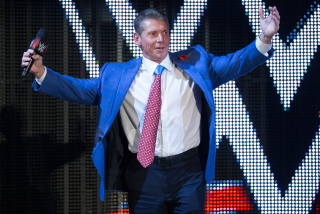Last Player in ZZZZ Best Case Settles Civil Suit
- Share via
An ex-associate of imprisoned carpet-cleaning mogul Barry Minkow has settled a civil suit brought against him by the federal government, admitting no wrongdoing and claiming he is too poor to pay the $720,000 judgment against him for his alleged role in defrauding investors.
The settlement with Maurice Rind of Encino, reached last week in U.S. District Court in Los Angeles, ends nearly six years of litigation by the Securities and Exchange Commission against key players in the ZZZZ Best empire begun by a teen-age Minkow in his family’s Reseda garage.
Karen Matteson, the SEC lawyer who handled the case, said the judgment signed by Judge Harry Hupp allows the commission to seek fines against Rind and even prison time if evidence surfaces that he lied about his ability to pay.
She added: “The commission made a decision that it was appropriate to settle on these terms because it saves the commission resources and at the same time, we’re protected.”
An attorney who defended Rind, Edward Gartenberg of West Los Angeles, could not be reached for comment Tuesday.
Rind, described by Matteson as a 55-year-old ex-stock broker with a history of SEC violations and prison time, was accused of lying about ZZZZ Best assets in financial documents to entice investors during a $15-million stock offering in December, 1986.
Acting as a consultant, Rind helped Minkow’s privately held company go public in January, 1986, and the stock offering later that year was aimed at raising more capital, Matteson said. She said that while preparing the documents for the stock offering, Rind exaggerated the value of 22 used power generators--claiming in documents they were worth nearly $2 million when they were purchased for less than $600,000.
The 64% overstatement of assets was crucial because it was just enough to make the company eligible to list stocks publicly, Matteson continued. Publicly filed financial statements did not disclose that the generators were bought from a wholly owned ZZZZ Best subsidiary that Rind managed, or that he received $720,000 in compensation from ZZZZ Best for his role in buying them, Matteson said.
The generators purportedly helped run the equipment used by Best employees as they restored fire and water-damaged buildings but in fact, Matteson said, the entire operation turned out to be a scam aimed at defrauding insurance companies and investors.
Investigations led to criminal cases against about a dozen people, including Minkow, who was hailed as a local “whiz kid” as his business grew and now, in his late 20s, is serving 25 years in federal prison for a variety of fraud charges.
Rind, twice convicted of SEC violations in New York in the 1970s, was never criminally charged in the ZZZZ Best case, Matteson said.
His settlement agreement ended five civil cases pursued by the SEC against 18 people, said Matteson. Meanwhile, she said, a class-action suit brought by investors is still pending in federal court.
More to Read
Inside the business of entertainment
The Wide Shot brings you news, analysis and insights on everything from streaming wars to production — and what it all means for the future.
You may occasionally receive promotional content from the Los Angeles Times.










